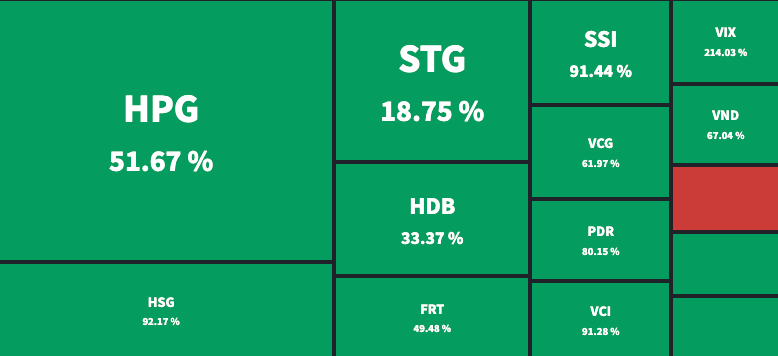Last week, widespread selling pressure across the market caused the VN-Index to drop sharply by 2.8%. Along with that, cautious sentiment prevailed due to increasing exchange rate pressure and the State Bank of Vietnam’s (SBV) move to issue treasury bills on September 21 and 22 to drain excess liquidity from the banking system to limit exchange rate speculation.
This development triggered a sell-off in the last two sessions of the week and caused speculative stocks to adjust sharply. Of which, the group of Securities stocks was sold off the most, showing signs of speculative cash flow weakening and shifting to a defensive state.
At the end of the trading week, the VN-Index still recorded an adjustment of 34.3 points, equivalent to a decrease of 2.8% compared to the previous weekend. At the same time, the HNX-Index decreased by 3.8% to 243.2 points and the UPCoM-Index decreased by 3.2% to 90.8 points.
The selling trend continued with the average trading value of the three exchanges decreasing slightly, reaching VND27,214 billion, down 10.2% compared to the previous week. Foreign investors net sold VND1,650 billion, down 23.4% compared to the previous week on HoSE, while net selling slightly VND5.4 billion on HNX and VND45 billion on UPCoM. In total, foreign investors net sold VND1,700 billion on all three exchanges.
Mr. Nguyen Ngoc Hai - Personal Client Specialist, VPS Securities Company and Mr. Dinh Quanh Hinh - Head of Macro and Market Strategy Department, Analysis Division, VNDIRECT Securities Company both commented that the market will not take much time to stabilize and recover.

Market valuation over the past year (Source: Fiintrade).
The Messenger : The market has seen strong selling pressure in the last two sessions of the week, focusing on the stock and real estate sectors. Do you think this trend will continue into next week? If the market recovers, what will the market fluctuate at?
Mr. Nguyen Ngoc Hai : The securities and real estate groups faced selling pressure in the last two sessions of the week. I think this trend will continue into the next week. In particular, the securities group has had a very strong increase recently because investors expect the KRX system to be put into use, which will bring great profits to securities companies (T+0 transactions).
But currently this system cannot be accepted, leading to a sell-off of stocks. However, this is just the "last straw" because the main reason is that the securities group is overvalued when the industry's P/E ratio is up to 35-40 times.
The real estate group has a more gentle development because it has not increased rapidly and has also had previous adjustments. Some codes have even lost their short-term increasing trend such as NVL, DIG, SCR... so there is a possibility that there will be differentiation in this group in the coming time.
Regarding the development of the VN-Index, I personally think that the market will fluctuate in the range of 1,150-1,250 in the near future due to the pressure of the stock group adjusting, however during this time, another group will replace the stock group to maintain the market rhythm.
Mr. Dinh Quanh Hinh: The Vietnamese stock market was under selling pressure in the last session of the week after the negative performance of the global stock market as well as domestic pressure related to the exchange rate issue.
However, in my opinion, the market will not take long to stabilize and recover. Investors should consider increasing their stock holdings to anticipate the third quarter earnings season.
Nguoi Dua Tin : Does the State Bank 's move to issue treasury bills to drain excess liquidity from the banking system have a strong impact on the market, in your opinion?
Mr. Nguyen Ngoc Hai : On September 21 and 22, the State Bank of Vietnam withdrew a total of VND 20,000 billion in the context of excess system liquidity with the average interbank interest rate being 0.14%. This move is only intended to stabilize the USD/VND exchange rate, avoiding the excess liquidity from turning into foreign currency speculation causing the VND to depreciate.
In the short term, this may slightly affect investor sentiment, but in the long term it will be good for the economy as the credit growth target ahead will see monetary policy continue to pump money into the market.

Top stocks with the most net foreign purchases since the beginning of the year.
Mr. Dinh Quang Hinh: To stabilize the exchange rate, the State Bank has issued treasury bills to absorb excess liquidity from the banking system, in order to limit foreign exchange speculation. However, many investors have a negative view and are concerned that this is a tightening move by the State Bank.
In fact, I think that this move by the State Bank is not a move to tighten or reverse the current loosening policy, but only a temporary, short-term solution to absorb excess liquidity to help limit exchange rate speculation. This move also aims to neutralize the State Treasury's previous purchase of foreign currency and injection of VND liquidity into the market.
The State Bank itself said it will continue to implement solutions to maintain liquidity in the banking system to support the economy, so I think the market may soon reconsider the State Bank's recent move to issue credit notes.
Nguoi Dua Tin : With general expectations of positive Q3 business results, which industry groups can investors maintain their holdings in?
Mr. Nguyen Ngoc Hai : I see that some industry groups have good business results but have been largely reflected in prices such as securities, chemicals, real estate, so investors should not participate in these groups. Investors can choose groups that have not increased and have expectations until the end of the year, specifically the banking group when from the beginning of the year until now there has not been much increase with the goal of loosening the credit room to 14-15% this year.
The public investment group has a continuously accelerated progress in public investment disbursement, the steel group has export expectations as world steel prices are increasing in the Europe-America region, the textile group has expectations of increasing year-end orders, the seafood group has a year-end holiday season in the Europe-America region and is continuously expanding its export market, etc.
Investors can refer to the above groups to choose stocks that are expected in the near future.
Mr. Dinh Quang Hinh: Market sentiment may stabilize again after rumors related to HoSE leaders and margin portfolio adjustments of a top securities company are corrected and clarified.
At the same time, the third quarter business results reporting season is approaching with expectations of more positive improvements (positive growth compared to the same period in the third quarter of 2023 compared to negative growth in the first half of this year) which will be a supporting factor for the market in the coming trading weeks.
Therefore, investors can take advantage of this adjustment to restructure their investment portfolio and increase the proportion of stocks when the VN-Index reaches the support zone of 1,170 - 1,180 points. They should prioritize businesses with positive business results prospects in the last two quarters of the year such as exports (seafood, wood products, chemicals), retail and public investment (construction, construction materials) .
Source





![[Photo] General Secretary To Lam receives Assistant to the President of Russia, Chairman of the Federal Maritime Council of Russia Nicolai Patrushev](https://vphoto.vietnam.vn/thumb/1200x675/vietnam/resource/IMAGE/2025/9/16/813bd944b92d4b14b04b6f9e2ef4109b)
![[Photo] General Secretary To Lam attends the National Conference to disseminate and implement 4 Resolutions of the Politburo](https://vphoto.vietnam.vn/thumb/1200x675/vietnam/resource/IMAGE/2025/9/16/70c6a8ceb60a4f72a0cacf436c1a6b54)
![[Photo] Prime Minister Pham Minh Chinh receives Minister of Foreign Affairs and Cooperation of Timor-Leste](https://vphoto.vietnam.vn/thumb/1200x675/vietnam/resource/IMAGE/2025/9/16/b0e99fd9a05846e4b6948c785d51d51f)
![[Photo] National conference to disseminate and implement 4 Resolutions of the Politburo](https://vphoto.vietnam.vn/thumb/1200x675/vietnam/resource/IMAGE/2025/9/16/5996b8d8466e41558c7abaa7a749f0e6)























































































Comment (0)